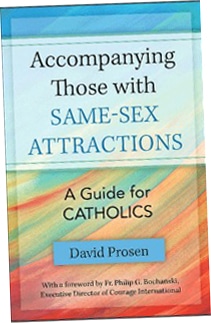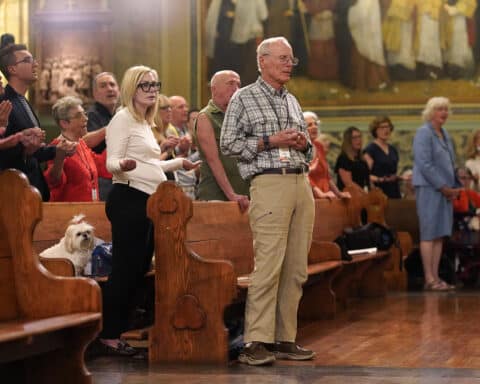The teachings of the Church on homosexuality are beautiful, freeing and filled with the message of truth, authentic love and hope. At the same time, it’s hard to read and learn these teachings in the dark or while in a very dimly lit room.
Today’s modern culture is dark and lacks the light of Christ. Some of the confusion from the culture has seeped its way into our Church. We need the illuminating light of Christ, which can pierce the darkness and light up the culture and especially some of those in the dark corners of our churches.
How do we bring the liberating and empowering words of the Catechism of the Catholic Church to our children who daily must leave the safety of our home brightly lit by the light of Christ?
Countering confusion
Outside the home, there is risk of receiving confusing messages of the culture from peers, teachers, television, social media and more.
The very first thing to do is pray and surrender. We need to surrender everything to Christ — our burdens, our fears, our hopes — and then we need to trust him. Ask him to show you the way, to give you the wisdom and discernment that you need, and he will provide.
Second, it’s important to strengthen your family. Consider having one day a week devoted to enjoying each other as a family, such as board games, watching a movie or going somewhere fun. But even more importantly, seek out ways to make Christ an active part of your family. Having a weekly or daily time of prayer to talk about God and the treasures of our Faith are vital and brighten your home with the light of Christ. Just as important, create an atmosphere of trust in which your children know they can ask you questions or discuss concerns.
It is extremely important that you can clear up any confusion the moment it begins. Some of their questions might be very difficult ones to which you don’t have the answers. Be honest and tell them that while you don’t know, you can find out the answer together.
Media influence
Be careful of what you allow your kids to watch on TV. You might want to watch with them. Some of the best shows today are beautifully done and contain wonderful messages, but they also can contain errors that stem from the confusion of the culture.
Almost every television show today has characters that identify as LGBT and, more importantly, promotes harmful messages that go against the teachings of the Church. By watching television shows with your children, you can address errors as you see them either during a commercial break or after the show. Ask what they saw and what is their understanding of it? Depending on their age, you can ask them what they suppose the Church would say about this. This will give you the opportunity to correct the errors and reinforce the truth by explaining why.
Armed with truth
This leads me to the third important task: We can’t plant a seed when we don’t have any seeds to plant. You are gathering the seeds you will need to plant by reading this article. Please don’t stop here. Continue to arm yourself with truth. You never know when God will want you to plant a seed. For this reason, we need to be equipped with the truth.
Resources
There is one book that may very well have most of your answers on how to discuss this and other moral topics with children: “Made this Way: How to Prepare Kids to Face Today’s Tough Moral Issues” (Catholic Answers Press, $16.95) by Leila Miller and Trent Horn. I highly recommend this as a go-to book before attempting to discuss this or other moral topics. It addresses not only what should be shared with little kids, but when and how, as well as what and how, to share with teens.
| Accompany with Compassion |
|---|
 Author David Prosen, in the book “Accompanying Those with Same-Sex Attractions” (OSV, $7.95), writes that it is not for us to fix the person with same-sex attraction. Rather, it is our place to simply love them. He says people with same-sex attraction need to hear that God cares for them, and he stresses the importance of affirming love and expressing the truth in a compassionate way. When someone shares the truth in a compassionate way, we are more likely to receive it.
|
What should be discussed with little kids? Miller and Horn quote from the pontifical document Truth and Meaning of Human Sexuality. Paragraph 125 states: “Homosexuality should not be discussed before adolescence unless a specific serious problem has arisen in a particular situation. This subject must be presented only in terms of chastity, health and ‘the truth about human sexuality in its relationship to the family as taught by the Church.'”
Points
A good friend of mine shared with me two points she believes are important in teaching young children, and I completely agree.
First, she believes that little children should be taught that God loves everyone, including those who do things that are wrong or think things that are mistaken. This includes all of us.
Second, this friend stressed the truth that love does not mean that we agree with everything someone else thinks and does, which needs to be explained to children at a young age. This is especially important in today’s climate, when many posts on social media call those who disagree haters or bigots.
Atmosphere of trust
Earlier, I spoke of our culture being in the dark. As young children become teens, they might become confused by the darkness, especially as they find out a friend or family member now identifies as LGBT. This is one reason why it is important to create an atmosphere of trust. If you can establish this when they are very young, they might come to you with these difficult questions or concerns when they are teens.
Lights on
Have you ever been in a room with the lights off, watching a movie, and someone abruptly turns the lights on when the film ends? Our eyes can hurt as they slowly adjust to the light. Similarly, we need to be careful when bringing the light of Christ to those accustomed to the darkness of our culture. That includes some teens. They may need the light slowly brought in, as if flipping just one light switch on at a time, rather than instantaneously turning them on all at once.
There are some DVDs or movies online that are beautifully done that can be watched with teens. One of my favorites (available on YouTube) by Blackstone Films is “The Third Way: Homosexuality and the Catholic Church.” I hesitate in saying this, because I do share part of my testimony in it. However, it is one of my favorites because it gives example to the three paragraphs on homosexuality found in the Catechism of the Catholic Church but brought to life through real people, biblical scholars and Catholic speakers. It’s a wonderful way to present the truth of the Catholic Church teaching. I highly recommend that you watch the film with your teen. In this way you can help them sort out their thoughts and answer any questions they might have.
After the film or the ensuing discussion, if your teen expresses anger, don’t worry. Anger is not necessarily a bad thing. If they work through it, God can use it to bring them to the truth. Validate their emotions, because all emotions are OK. Help them explore why they are angry. This anger might get cleared up quickly, or it might not. If they need time, give it to them and let them know that you are there any time they want to talk about it.
And then pray. Ask God to reveal his truth and to provide you or others with the seeds that your teen needs. Allow God to do his part in watering the soil in which the seed is planted and providing the sunshine.
You provide your love and prayers, and, when prompted by the Holy Spirit, check in with them and plant another seed or two.
Light in dark times
We are living in dark times, and we don’t have to stumble through the darkness. Christ told us not to hide our light under a bushel. That light is Christ; let us surrender to him and beg for his light to penetrate the hearts of those living in this culture of chaos and especially in the hearts of our families and children.
David Prosen is a graduate of Franciscan University in Steubenville with a master’s in counseling.
| Resources |
|---|
|
For further resources on Church teaching on homosexuality, visit davidprosen.com.
|
Main image by Shutterstock.





